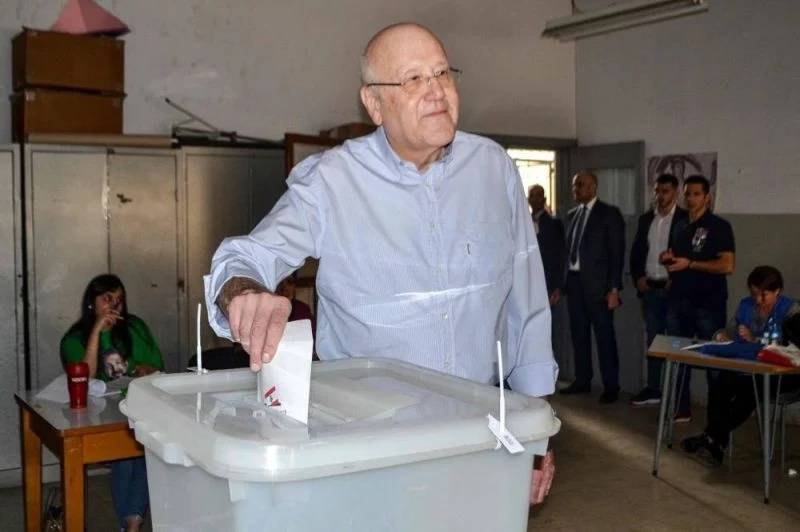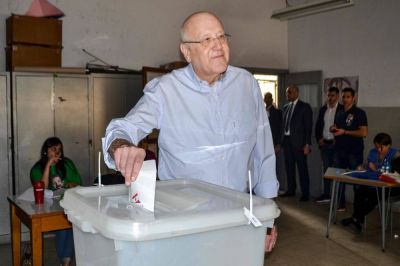
Outgoing Prime Minister Nagib Mikati deposits his ballot in the ballot box in Tripoli during the legislative elections on May 15. (Credit: Fathi el-Masri/AFP)
A scenario in which holding binding parliamentary consultations to appoint a prime minister without Saad Hariri or any other major Sunni figure was highly unlikely a few years ago, when the Future Movement and its leader almost monopolized the Sunni community’s representation in Parliament. But, this is no longer the case.
The parliamentary consultations that should be held in the coming days in Baabda, as announced by President Michel Aoun on Thursday, will take place in the absence of the pro-Hariri MPs who boycotted the parliamentary elections of May 15.
This is unprecedented. The former prime ministers (Najib Mikati, Tammam Salam and Fouad Siniora), similar to the Future Movement’s head, also decided not to run as candidates in the elections.
The absence of major Sunni figures from this constitutional milestone raises questions on the Sunni cover any future prime minister is likely to enjoy. That is particularly true since his cabinet could be required to run the country’s affairs amid a [potential] presidential vacuum, after Aoun’s presidential term expires on Oct. 31.
Caretaker Prime Minister Mikati’s remarks on Friday go in this direction. He said while in Jordan that “the presidential election could be delayed.”
The May elections, which were boycotted by Hariri, who announced in January the suspension of his political career, did not lead to the election of a substantial Sunni parliamentary bloc capable of imposing its choice in the appointment of the new prime minister.
Several Sunni MPs, including Hassan Mrad (Bekaa West), Jihad al-Samad (North II) and Yanal Solh (Baalbeck-Hermel) to name a few, have rallied behind Hezbollah and can therefore facilitate the appointment of a candidate from the March 8 camp.
“The existence of a Sunni cover for the prime minister has been out of the question since the coup by [Hezbollah members dressed in] black shirts against Saad Hariri’s government in 2011,” said Mustapha Allouche, former vice-president of the Future Movement, who resigned from the party to run in the elections, but who ultimately was not elected.
“There is also the fact that Hariri made compromises at the country’s expense,” he added, criticizing the 2016 Hariri-Aoun agreement that brought Hezbollah’s candidate, Aoun, to the Presidential Palace in Baabda.
Hezbollah’s ‘clever tactics’
Will Hezbollah have the last word in selecting the new prime minister? The question becomes all the more legitimate when one considers that L’Orient-Le Jour obtained information indicating that the Shiite party is trying to keep the outgoing prime minister in office in the remaining months of Aoun’s term. Therefore, we ask, will a Hassan Diab scenario be repeated?
Following the resignation of Hariri’s government in the wake of the October 2019 protest movement, Hezbollah managed to impose its candidate, Diab, who was appointed with a bare winning majority of 69 votes, despite the opposition of the Sunni leadership and public opinion.
“Hezbollah did not impose Hassan Diab in a unilateral way. The latter ran the country for several months thanks to the confidence of Parliament, in which all the protagonists were present,” political analyst Karim Mufti told L’Orient-Le Jour.
“Hezbollah has been using a clever tactic consisting of involving everyone in the political process. This is in order for it not to solely assume the responsibility,” he said.
It is therefore through this prism that one should analyze the pro-Iran party’s efforts in favor of Mikati, the preferred candidate for his own succession in the absence of other proposals, particularly since the latter is known for his ability to smooth the edges.
L’Orient-Le Jour’s political columnist Mounir Rabih recently reported that even Bahia Hariri, Saad Hariri’s aunt, is in favor of reappointing Tripoli’s billionaire. The same goes for the independent MPs gravitating within the Hariri orbit, said Walid Baarini, an MP for Akkar contacted by L’Orient-Le Jour.
Mikati is the only choice
“One must not forget that the outgoing prime minister is a heavyweight on the Sunni scene. He therefore has his own stature,” said Mufti. The analyst and one of the former prime ministers agree on this point.
“Mikati has his own base that supports him across the board,” said this member of the former prime ministers’ club, which claims to represent the pulse of the Sunni street.
It is therefore the only “Sunni bloc,” united against Hezbollah and its allies, which did not support the appointment of Diab at the time.
“It is true that we do not have a parliamentary presence. But we are a powerful political force,” said the club member.
Yet, this time, none of the club members will meet with the head of state for the parliamentary consultations.
“We need to be pragmatic. It is true that the former prime ministers did not run in the elections, but the Sunni community still has a presence in Parliament and its MPs will express their views in Baabda,” said Ali Darwish, a former Tripolitan MP who is close to Mikati, suggesting that the latter was ready to form the future ministerial team, even without explicit Sunni support from those opposing Hezbollah.
Mikati is the only choice at the moment,” said the former prime ministers’ club member. But this does not mean that he will be able to form his team, because he will have to deal with those who have already started to impose their conditions.”
These remarks are tantamount to a criticism leveled at the Free Patriotic Movement’s head Gebran Bassil, who is accused of insisting on keeping some juicy portfolios, including the Energy Ministry, and putting back on the table the removal of Lebanon’s central bank Governor Riad Salameh from his post.
For his part, Mikati is seemingly aware of his strong position in the absence of any serious competition. He is therefore slowly but surely imposing his conditions for the cabinet formation. These include the adoption of a reform program and economic recovery plan.
“Mikati will be ready to form a new team if he is sure that it can achieve something and is not subject to preconditions,” Darwish said.
This article was originally published in French in L'Orient-Le Jour. Translation by Joelle El Khoury.
